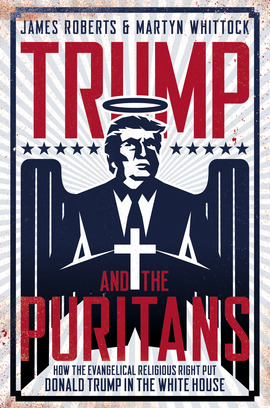It's Friday and you know what that means: we're turning our attention overseas for our day on foreign affairs! Kicking things off is a blog by Trump and the Puritans author Martyn Whittock who takes us on a tour of Trump in the age of coronavirus...
 1.Trump and the Puritans came out in January. Have the events of the past few months changed your view of Trump’s presidency at all? If so, how?
1.Trump and the Puritans came out in January. Have the events of the past few months changed your view of Trump’s presidency at all? If so, how?
Events since Christmas have reinforced the conclusions we came to in the book. The deepening polarization of US politics following the failed impeachment; the continuing loyalty of the Trump base; the Democrats’ difficulties in selecting a candidate with broad appeal but also having energizing engagement with those feeling marginalized, have all continued trends apparent under the Trump presidency. The latter point underscores the dilemma: should a successful opposition candidate just offer a ‘steady pair of hands’ (basically Biden) in contrast to Trump the ‘chaos-candidate’, or should one offer their own brand of opposition-radicalism (like the failed candidature of Sanders). Trump continues to upset the apple cart! But we may be in the middle of a game-changing event in the form of the Covid19 crisis. The ‘chaos candidate’ has met a ‘chaos event’; one with the potential to lay bare the inadequacies of the Trump presidency.
2. What’s the legacy of the Mayflower Pilgrims in modern America? Do you believe Trump carries on that legacy?
November 2020 sees the next US Presidential election and the 400th anniversary of the Mayflower’s arrival in North America. The survival of Plymouth Colony led the way to a much larger (and even more influential) influx of Puritan colonists a little further north in the 1630s, to form the Massachusetts Bay Colony. The legacy of the Mayflower, and then of Puritan New England, is woven into the cultural DNA of what became the USA. We see it in a deeply-felt sense of ‘national exceptionalism’, of America being a ‘city on a hill’ that others should emulate, of battling the alien ‘other’. Trump’s nativism and slogans like ‘America First’ play well to the nationalistic version of this legacy. And the concept of ‘Make America Great Again’, harks back to a mythical past of pioneering strength, in opposition to many aspects of modernity.
3. Has Trump’s response to coronavirus been influenced by the evangelical movement? How?
There is no unified evangelical response to, or interpretation of Covid19. An online search revealed a well-known and influential evangelical church in California working comfortably within the state lockdown, but another in Louisiana claimed 1,300 in attendance on Easter Sunday – under the slogan "Satan and a virus will not stop us" – in defiance of the state’s governor. Other examples of attempts to defy or work round the regulations can be found at similar churches in California and Texas for example. State restrictions, regarding large gatherings, have met a hostile reaction from some evangelical leaders who argue it constitutes a breach of religious freedom. One can see that this feeds into the current Trump mood-music of an early end to lockdown and attacking those who warn of the dangers, or criticise the administration’s response, as being purveyors of unpatriotic Fake News.
4. In a nutshell, what is Trump’s relationship with the evangelical movement? Are they using each other or does he genuinely believe in their views?
It started as a ‘marriage of convenience’ – Trump was and is no ‘evangelical’, unlike George W. Bush or Mike Pence. But the evangelical-right adopted him as the most likely political candidate to beat the Democrats and he has repaid them abundantly. Now, I think it’s become a mutual love affair. In some ways they are using each other but their relationship is now deeply interwoven and mutually beneficial.
5. Currently, Joe Biden looks to be the frontrunner for the Democratic nomination. What are your predictions for how this year’s election might unfold?
The damage being done by Covid19 has weakened Trump. But never underestimate his remorseless self-promotion; his spinning of events and promulgation of alternative narratives; or his angry shifting of blame onto ‘enemies’ in ways that chime with his base, and with other anxious and angry people. Chaos is his natural environment. Biden is facing an uphill struggle to be noticed. Chaos is not his natural environment. November’s outcome is far from clear.
6. What projects do you have in the pipeline at the moment? Are you working on any new projects?
I am currently researching a book on apocalyptic millenarianism and its impact on radical populist politics, historically and in the modern world. Rather fitting in such unstable times.
7. What are you doing to stay occupied during the lockdown? Have you picked up any new hobbies?
Mostly I have been writing – and gardening. I’ve not started any new hobbies – but I can now work Zoom and upload to YouTube!
8. What are you reading at the moment?
I've just finished ‘In America’, by Caitríona Perry, in which she explores the American heartland of Trump supporters and their outlook and motivations.
Thank you, Martyn! If this blog piqued your interest in Trump's America, why not check out Trump and the Puritans: only £15.00 until 26th April!
